Diana Naichenko
We’d like to introduce you to Diana, one of our first volunteers who has done the most work trips in our community!
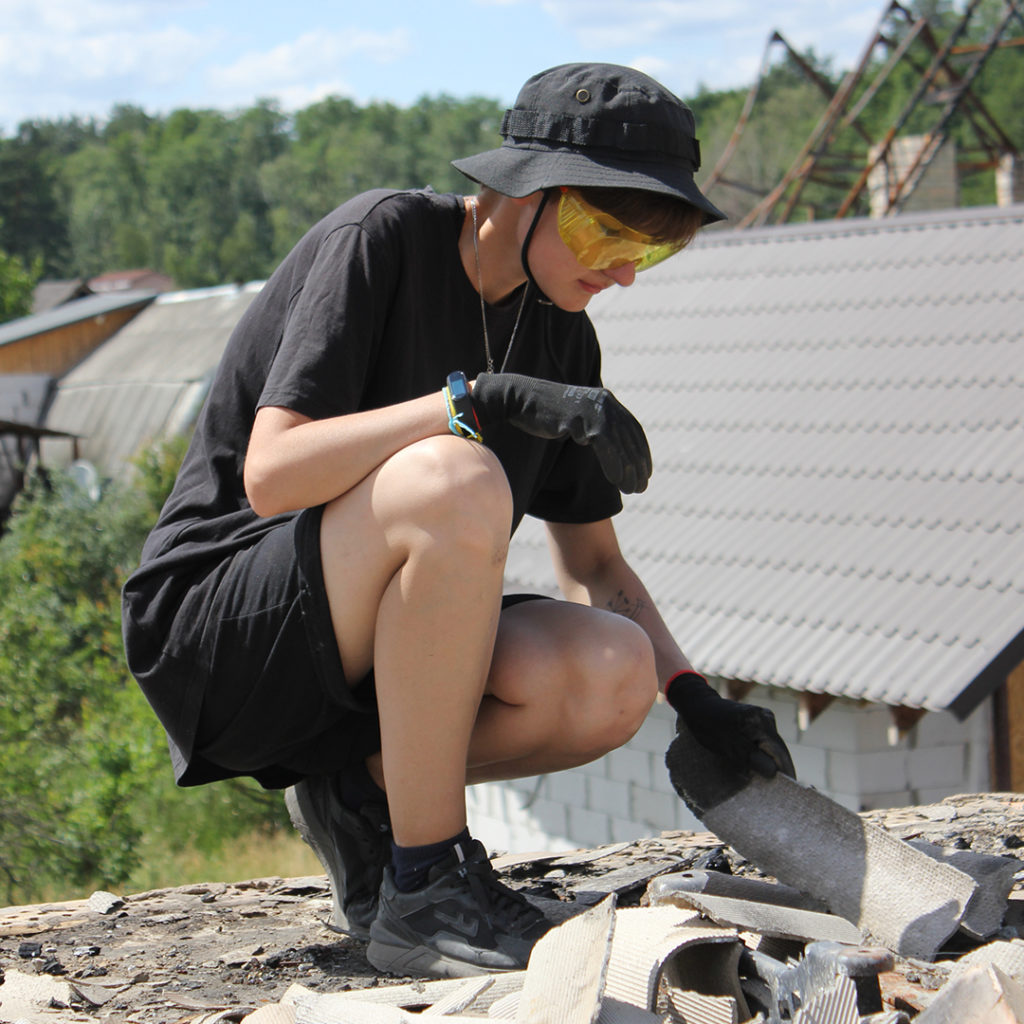
While Ukrainians were horrified to read the news about the occupiers’ cruelties in Bucha, she was already helping in the recently liberated Irpin. We often joke that Diana Naichenko joined B50 even before the current leaders of our charitable organization.
Read #B50heroes interview with Diana Naichenko
- how she became an instructor in firearms handling training;
- what she saw in Irpin in the first days after the occupation;
- why she wants to join the Armed Forces of Ukraine and defend the country.
| Name | Naichenko Diana Yaroslavivna |
| City | Kyiv |
| Age | 19 years old, birthday – December 19 |
| Profession | Student, a future historian-archaeologist, studying at Borys Hrinchenko Kyiv University |
| Hobbies | Used to study at an art school and enjoyed painting nature |
| Sea or mountains? | Mountains! In her childhood, she was often taken to the sea, where it was sad |
| Childhood sport | In the 4th grade, she went dancing a little bit, and loved rollerblading. She also played volleyball and chess. |
| Favorite food | Grandma’s borsch, Ukrainian (no one can cook it like her grandmother!). |
– Diana, where were you on February 24? How did you know that russia’s large-scale invasion of Ukraine had begun?
– We were all sleeping – me, my mom, my younger sister. And then my mother received a call from her boss at about 8 a.m. saying, “The war has started, they are launching missiles.” It was a shock for all of us.
I was really scared then, because I didn’t know what to do. The only thing I knew for sure was that I would not leave Ukraine. I would not leave Kyiv. No matter how scared I was, I would not dare to leave the country. I decided to stay in Kyiv. It was a matter of principle. I wanted my mom and sister to go abroad, but I heard the same thing: “We won’t go without you.”
– What did you do at first when you stayed in the capital?
– It so happened that about a week before the full-scale invasion (or even more), I learned about the Territorial Defense from my classmate. And we wanted to join together. That’s why we were busy with documents and passing the medical examination.
After a full-scale war broke out, we ended up joining the Territorial Defense, but not in the way we had planned.
– So you wanted to defend our country?
– Well, of course I did. I often hear from people that they did not believe in the possibility of a full-scale invasion. It surprises me! It is immediately obvious who knows history and how well. You can draw a parallel between our time and the beginning of World War II, comparing Hitler and putin. Could anyone have said then that Hitler would stop at the Anschluss of Austria? No. Europe was convinced that Hitler only wanted territories with a German-speaking population, and therefore turned a blind eye to some things (does this remind anyone of the occupation of Donetsk, Luhansk, and Crimea to protect the “russian-speaking population”?) The Germans were being cheated with propaganda that it was necessary to “restore historical justice and take back our lands.” Now russians have similar themes on their TVs.
I realized that sooner or later there would be a full-scale invasion. I realized that putin would not leave Ukraine alone. I realized that we would face difficult times in the future and that we, all of us, would have to defend our independence and freedom. So I was seriously thinking about signing a contract with the Armed Forces after graduation to be ready. But here’s the rub: I couldn’t predict exactly when putin would start a war.

– You appeal to history for a reason. You are a future historian and archaeologist by profession. Where did your interest come from?
– I am very grateful to my teacher Larysa Mykolayivna for the fact that I went to study history. This woman really taught me to love and be interested in history. She knows how to tell stories in an interesting way. She would often bring maps and magazines to class, show old videos, and come up with interesting projects and assignments.
– But clearing the rubble in Moshchun and participating in the Territorial Defense you wanted to do are rather polar “activities.” How did fate bring you to the B50 community?
– It so happened that we formed a group of territorial defense reservists, and we decided to look for instruction in weapons, medicine, and tactics on our own. We realized that no one would bother with us. Our group received a message from Sasha (one of the organizers of the B50 volunteer group) that they were holding instructional sessions in the Lisovyi Masyv (Kyiv district- ed.), exactly the kind we needed. I came, and I was good at it (I spent two years at school disassembling and reassembling a machine gun with the guys). And the chief instructor offered to work with them. I thought he was joking, but he was serious.
– What were your duties as an assistant instructor?
– After each of our classes, people had the opportunity to disassemble and reassemble the machine gun themselves. I made sure that everything was done correctly, sometimes I prompted them, sometimes I showed them again so that they would remember it better. I also worked with women, because for some reason most of them were afraid to pick up a machine gun, and I had to teach them not to be afraid, but to always think about the “increased” responsibility with weapons.
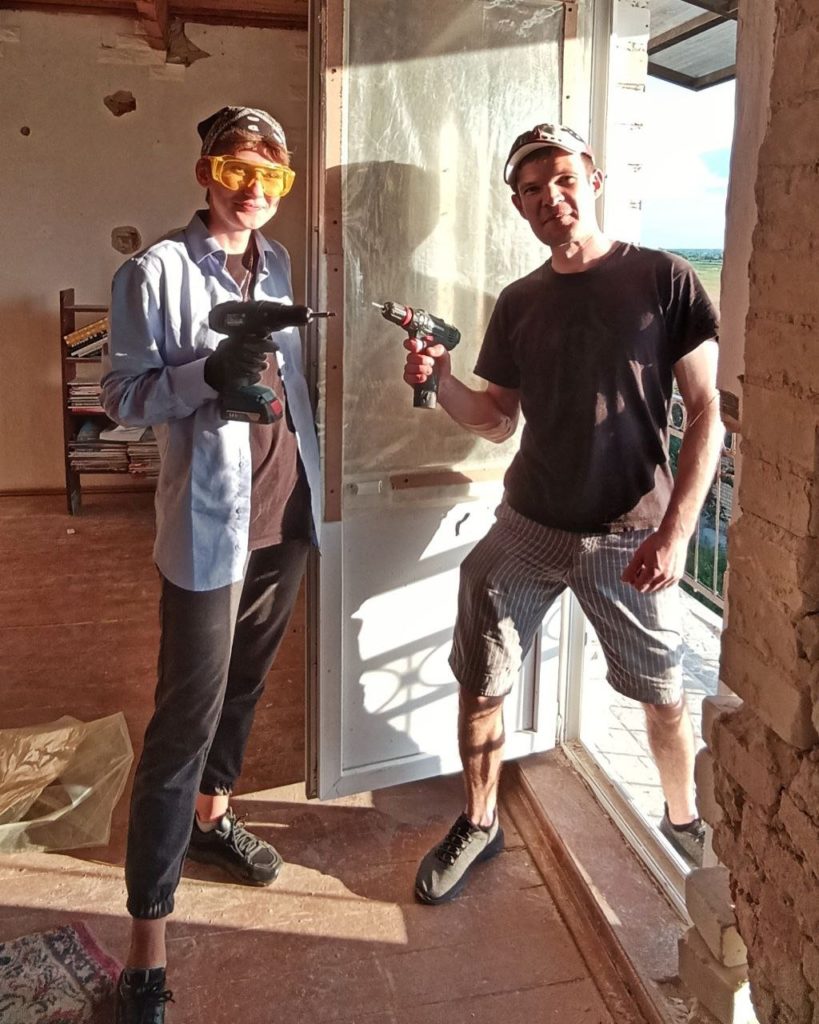
– You were one of the first volunteers to arrive in the newly liberated Irpin. What did you see in the city? What did you feel?
– It was not like it is now. Back then, there was a lot of fuss from the host side (local authorities). And there was a lot of chaos among the volunteers as well. Searching for a driver and a free seat, the mission to “dress as warmly as possible to avoid freezing.” And constant traffic jams on the roads. Hundreds of volunteers gathered and went to help people. It was impressive! I was so proud of our people that the phrase “not in my backyard” definitely does not apply to us!
When I first came to Irpin, I was scared. Most residential buildings were damaged, shot at, and destroyed. You couldn’t see ordinary people, only utility workers, military and volunteers.
We were brought to the location and briefed on where we could and could not go, what to do and how to behave. We were also warned that the sappers could have missed something, so we had to be very careful. At first, I did everything slowly, trying to be careful. But then I noticed that most people were working more actively, not really looking at what was under their feet. Then I decided not to waste time and work more efficiently, because there was a lot of work to do.
I realized that I didn’t want to stay at home. I want to help people. So I decided to do everything in my power to help civilians and the military. In April, I started actively riding with volunteers in the Kyiv region. I have been everywhere. It all started with Irpin. Then came Bucha, Vorzel, Hostomel, Borodianka, Moshchun.
– In B50, they mention Diana as a girl who quickly assembles a rifle and digs trenches efficiently. Tell us, what attracted you to providing such assistance to the military?
– I wanted to join the Armed Forces, but it didn’t work out. So I decided to help the military in some way. The first time I went to the trenches was in Gostomel. I already have experience with a shovel, as I am studying not just history, but also archaeology, and I have already been to excavations. So for me it was a simple job. I know how I need to hold the shovel, how fast I need to dig so that I don’t get tired quickly. And this helps me to always be “in the resource”. In total, I spent about a month and a half in the trenches. It was a very cool experience!
Now I just can’t imagine my life without volunteering! It feels like I’ve been doing it all my life. Back in 2014-2015, when volunteering in the war was just emerging in Ukraine, I didn’t understand how it all worked, it must have been such a chaos.
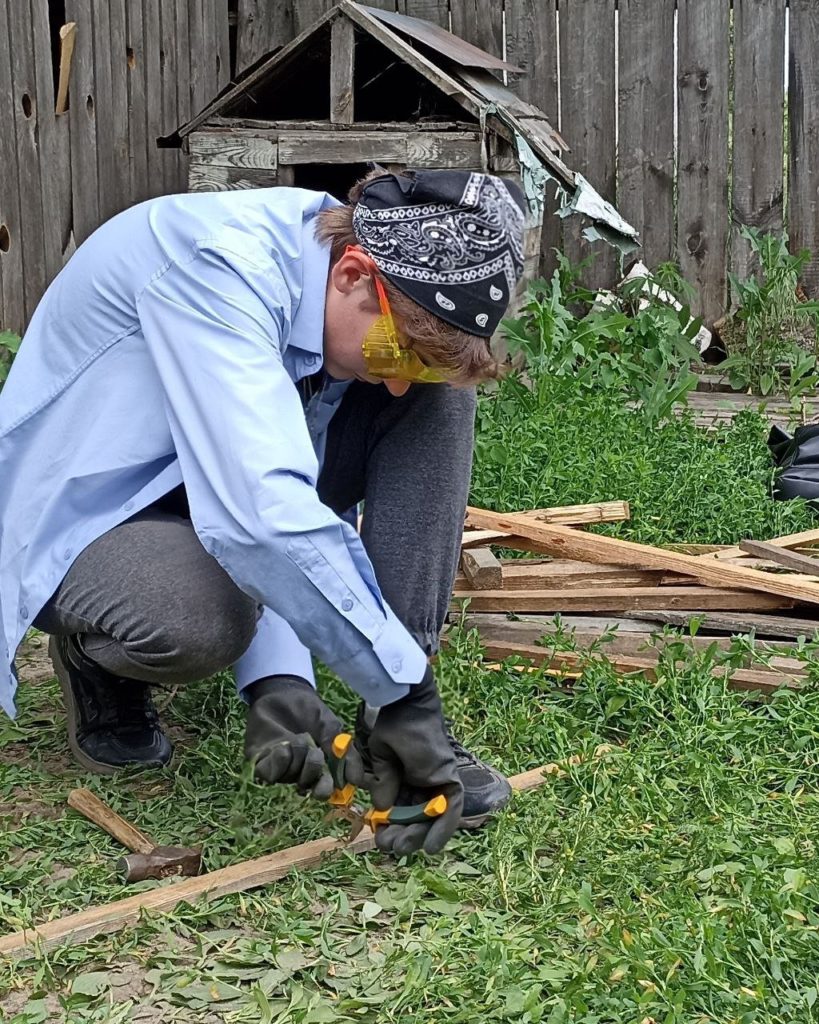
– Where did this stereotype of chaos in volunteering come from? You must have encountered it somehow in your life?
– In 2015, we sent my father to the ATO (Anti-Terrorist Operation – ed.). We had to pack him up. I was about 12 years old at the time, and I don’t remember this period well, but we spent a long time collecting ammunition for him. We also bought something on our own.
Now it has all reached a new level. More and more people are becoming volunteers. There are more areas, more opportunities, more communication networks for volunteers. I’m not talking about the level of organization. Volunteering is a great opportunity to benefit people and the country, and you don’t have to have any special skills. In my opinion, it is enough to have a desire to help and not be lazy.
The most important thing is not to set yourself any limits. Any help is important, whether it’s helping the military or animal shelters. Therefore, you should do what you want. We all do what we can, there is no choice, we will win:)
– What do you like about volunteering now, after such a radical transformation of its understanding? What inspires you?
– I like everything about volunteering. You can choose your own work. Whether it’s looking for medicines for the military, distributing hot meals and collecting humanitarian aid for IDPs (internally displaced persons – ed.), weaving camouflage nets, organizing charity fairs. Or simply clean the streets and territory from garbage. Such a wide range of opportunities helps everyone find their job.
I inspire myself. It sounds strange, but it’s true. I really like what I do. For me, it’s not even a hobby, it’s a full-time job. I always tell newcomers that they should do volunteering not for PR or anything else, but simply because they want to.
The best job in Moshchun is hitting the walls with a sledgehammer. I don’t know why, but I just love this process.
– When you pick up a sledgehammer, you look determined! Have you ever had a situation when your heart was in your throat while volunteering?
– Yes, I have. The first time I climbed on the roof without insurance. I had never done this before, and given that the roof was damaged, it was… But I believe that if you are afraid of something, you have to fight it. “Oh, I’m afraid, I won’t go there” should not be an excuse, it should be a reason for you to go and do it. That’s why whenever something makes me afraid, I try not to shut down, but rather to overcome myself and my fear. Now I’m not afraid to climb on damaged roofs and work there.
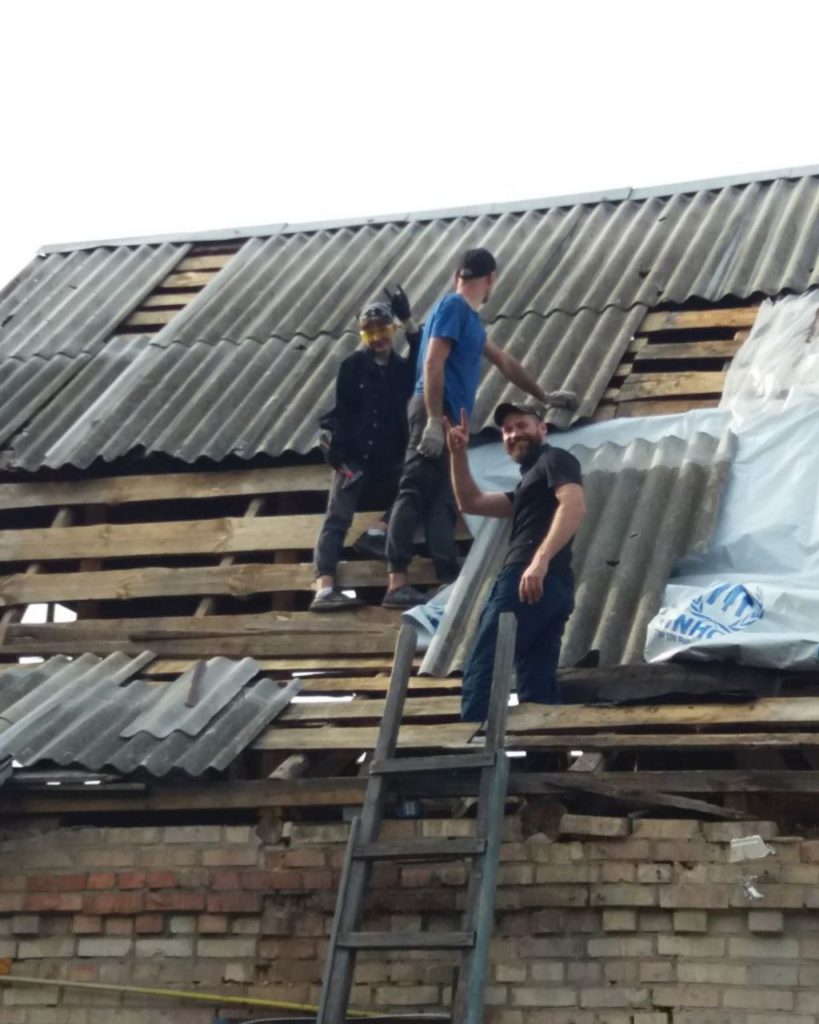
– How do you see the future of the B50 community? What should we do when the fall and winter come?
– I think our organization will only grow. Our organizers are real heroes who have taken on hard and responsible work for the sake of the foundation’s development. I am very grateful to them for that.
But I do not want the organization to develop only in terms of construction. It would be great if we developed in different directions. As far as I know, we already have groups that work with nets and trench candles. That’s also cool! But if we want to become a powerful organization, we need to work on all fronts and all over Ukraine. I think it will be quite realistic in a couple of years.
Personally, I would like to help with humanitarian aid for the military in hot spots. This kind of work is obviously not for everyone, but I think there are a couple of people who are ready for such an extreme.
– What will Ukraine look like in the next few years?
– This question is quite interesting. The war will not end in 2 years (or even in 3-4 years). It will drag on… The war will not end as long as the russian federation exists as a country. We have only two options: either Ukraine will fall and russia will seize all the territories, or Ukraine will stand and hold on until the russian federation collapses. This is the only way I see the war ending.
As for the future of Ukraine itself, it’s hard for me to say. It all depends on people and only people. We shouldn’t think that politicians will “fix everything,” and we should sit back and wait. The waiting period is over, it’s time to act. People must be conscious and responsible. Patriotism is manifested not in the language you speak or the music you listen to, but in your actions and your position towards the country. And when every Ukrainian realizes this, then there will be changes in society, then we as a nation will develop spiritually.
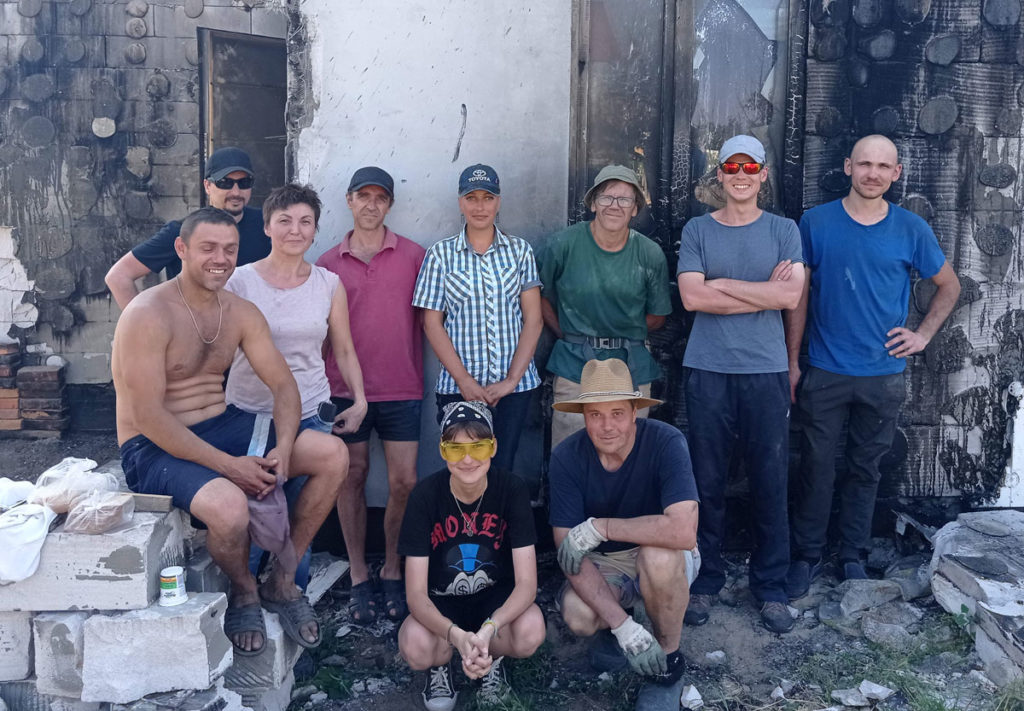
The interview team:
- Interviewer – Nataliia Hryniuk
- Editor – Kateryna Lehka
- Translator – Anastasiia Lypchak


